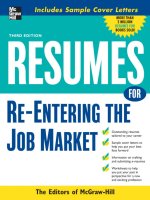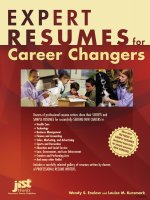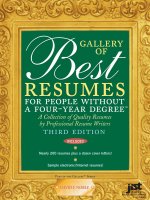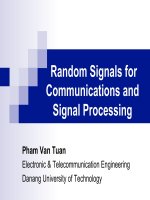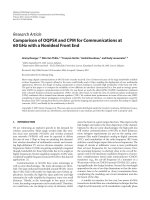Resumes for communications careers
Bạn đang xem bản rút gọn của tài liệu. Xem và tải ngay bản đầy đủ của tài liệu tại đây (891.79 KB, 160 trang )
RESUMES
FOR
Communications Careers
This page intentionally left blank.
VGM Professional Resumes Series
THIRD EDITION
RESUMES
Communcations
Careers
With Sample Cover Letters
The Editors of VGM Career Books
FOR
Copyright © 2003 by The McGraw-Hill Companies, Inc. All rights reserved. Manufactured in the United States of America. Except as permitted under the United States Copyright Act of 1976, no part of this publication may be reproduced or distributed in any form or by any means, or
stored in a database or retrieval system, without the prior written permission of the publisher.
0-07-142671-X
The material in this eBook also appears in the print version of this title: 0-07-140593-3
All trademarks are trademarks of their respective owners. Rather than put a trademark symbol after every occurrence of a trademarked name,
we use names in an editorial fashion only, and to the benefit of the trademark owner, with no intention of infringement of the trademark.
Where such designations appear in this book, they have been printed with initial caps.
McGraw-Hill eBooks are available at special quantity discounts to use as premiums and sales promotions, or for use in corporate training
programs. For more information, please contact George Hoare, Special Sales, at or (212) 904-4069.
TERMS OF USE
This is a copyrighted work and The McGraw-Hill Companies, Inc. (“McGraw-Hill”) and its licensors reserve all rights in and to the work.
Use of this work is subject to these terms. Except as permitted under the Copyright Act of 1976 and the right to store and retrieve one copy
of the work, you may not decompile, disassemble, reverse engineer, reproduce, modify, create derivative works based upon, transmit, distribute, disseminate, sell, publish or sublicense the work or any part of it without McGraw-Hill’s prior consent. You may use the work for
your own noncommercial and personal use; any other use of the work is strictly prohibited. Your right to use the work may be terminated if
you fail to comply with these terms.
THE WORK IS PROVIDED “AS IS”. McGRAW-HILL AND ITS LICENSORS MAKE NO GUARANTEES OR WARRANTIES AS TO
THE ACCURACY, ADEQUACY OR COMPLETENESS OF OR RESULTS TO BE OBTAINED FROM USING THE WORK, INCLUDING ANY INFORMATION THAT CAN BE ACCESSED THROUGH THE WORK VIA HYPERLINK OR OTHERWISE, AND EXPRESSLY DISCLAIM ANY WARRANTY, EXPRESS OR IMPLIED, INCLUDING BUT NOT LIMITED TO IMPLIED WARRANTIES OF MERCHANTABILITY OR FITNESS FOR A PARTICULAR PURPOSE. McGraw-Hill and its licensors do not warrant or guarantee that the functions contained in the work will meet your requirements or that its operation will be uninterrupted or error free. Neither McGraw-Hill nor its
licensors shall be liable to you or anyone else for any inaccuracy, error or omission, regardless of cause, in the work or for any damages resulting therefrom. McGraw-Hill has no responsibility for the content of any information accessed through the work. Under no circumstances
shall McGraw-Hill and/or its licensors be liable for any indirect, incidental, special, punitive, consequential or similar damages that result
from the use of or inability to use the work, even if any of them has been advised of the possibility of such damages. This limitation of liability shall apply to any claim or cause whatsoever whether such claim or cause arises in contract, tort or otherwise.
DOI: 10.1036/007142671X
For more information about this title, click here.
Contents
Introduction
Chapter 1
The Elements of an Effective Resume
vii
1
Chapter 2
Writing Your Resume
17
Chapter 3
Assembly and Layout
21
Chapter 4
The Cover Letter
33
Chapter 5
Sample Resumes
37
Chapter 6
Sample Cover Letters
Copyright 2003 by The McGraw-Hill Companies, Inc. Click Here for Terms of Use.
125
This page intentionally left blank.
Introduction
our resume is a piece of paper (or an electronic document) that
serves to introduce you to the people who will eventually hire you.
To write a thoughtful resume, you must thoroughly assess your personality, your accomplishments, and the skills you have acquired. The act
of composing and submitting a resume also requires you to carefully consider the company or individual that might hire you. What are they looking for, and how can you meet their needs? This book shows you how to
organize your personal information and experience into a concise and wellwritten resume, so that your qualifications and potential as an employee
will be understood easily and quickly by a complete stranger.
Writing the resume is just one step in what can be a daunting jobsearch process, but it is an important element in the chain of events that
will lead you to your new position. While you are probably a talented,
bright, and charming person, your resume may not reflect these qualities.
A poorly written resume can get you nowhere; a well-written resume can
land you an interview and potentially a job. A good resume can even lead
the interviewer to ask you questions that will allow you to talk about your
strengths and highlight the skills you can bring to a prospective employer.
Even a person with very little experience can find a good job if he or she
is assisted by a thoughtful and polished resume.
Lengthy, typewritten resumes are a thing of the past. Today, employers do not have the time or the patience for verbose documents; they look
for tightly composed, straightforward, action-based resumes. Although a
one-page resume is the norm, a two-page resume may be warranted if you
have had extensive job experience or have changed careers and truly need
the space to properly position yourself. If, after careful editing, you still
need more than one page to present yourself, it’s acceptable to use a second page. A crowded resume that’s hard to read would be the worst of
your choices.
Y
Copyright 2003 by The McGraw-Hill Companies, Inc. Click Here for Terms of Use.
vii
viii
Introduction
Distilling your work experience, education, and interests into such a
small space requires preparation and thought. This book takes you stepby-step through the process of crafting an effective resume that will stand
out in today’s competitive marketplace. It serves as a workbook and a place
to write down your experiences, while also including the techniques you’ll
need to pull all the necessary elements together. In the following pages,
you’ll find many examples of resumes that are specific to your area of interest. Study them for inspiration and find what appeals to you. There are a
variety of ways to organize and present your information; inside, you’ll
find several that will be suitable to your needs. Good luck landing the job
of your dreams!
RESUMES
FOR
Communications Careers
This page intentionally left blank.
Chapter
1
The Elements of an
Effective Resume
n effective resume is composed of information that employers are
most interested in knowing about a prospective job applicant. This
information is conveyed by a few essential elements. The following is a list of elements that are found in most resumes—some essential,
some optional. Later in this chapter, we will further examine the role of
each of these elements in the makeup of your resume.
A
• Heading
• Objective and/or Keyword Section
• Work Experience
• Education
• Honors
• Activities
• Certificates and Licenses
• Publications
• Professional Memberships
• Special Skills
• Personal Information
• References
Copyright 2003 by The McGraw-Hill Companies, Inc. Click Here for Terms of Use.
1
2
Resumes for Communications Careers
The first step in preparing your resume is to gather information about
yourself and your past accomplishments. Later you will refine this information, rewrite it using effective language, and organize it into an attractive layout. But first, let’s take a look at each of these important elements
individually so you can judge their appropriateness for your resume.
Heading
Although the heading may seem to be the simplest section of your resume,
be careful not to take it lightly. It is the first section your prospective
employer will see, and it contains the information she or he will need to
contact you. At the very least, the heading must contain your name, your
home address, and, of course, a phone number where you can be reached
easily.
In today’s high-tech world, many of us have multiple ways that we can
be contacted. You may list your E-mail address if you are reasonably sure
the employer makes use of this form of communication. Keep in mind,
however, that others may have access to your E-mail messages if you send
them from an account provided by your current company. If this is a concern, do not list your work E-mail address on your resume. If you are able
to take calls at your current place of business, you should include your work
number, because most employers will attempt to contact you during typical business hours.
If you have voice mail or a reliable answering machine at home or at
work, list its number in the heading and make sure your greeting is professional and clear. Always include at least one phone number in your
heading, even if it is a temporary number, where a prospective employer
can leave a message.
You might have a dozen different ways to be contacted, but you do not
need to list all of them. Confine your numbers or addresses to those that
are the easiest for the prospective employer to use and the simplest for you
to retrieve.
Objective
When seeking a specific career path, it is important to list a job or career
objective on your resume. This statement helps employers know the direction you see yourself taking, so they can determine whether your goals are
in line with those of their organization and the position available. Normally,
The Elements of an Effective Resume
3
an objective is one to two sentences long. Its contents will vary depending
on your career field, goals, and personality. The objective can be specific
or general, but it should always be to the point. See the sample resumes in
this book for examples.
If you are planning to use this resume online, or you suspect your
potential employer is likely to scan your resume, you will want to include
a “keyword” in the objective. This allows a prospective employer, searching hundreds of resumes for a specific skill or position objective, to locate
the keyword and find your resume. In essence, a keyword is what’s “hot”
in your particular field at a given time. It’s a buzzword, a shorthand way
of getting a particular message across at a glance. For example, if you are
a lawyer, your objective might state your desire to work in the area of corporate litigation. In this case, someone searching for the keyword “corporate litigation” will pull up your resume and know that you want to plan,
research, and present cases at trial on behalf of the corporation. If your
objective states that you “desire a challenging position in systems design,”
the keyword is “systems design,” an industry-specific, shorthand way of
saying that you want to be involved in assessing the need for, acquiring,
and implementing high-technology systems. These are keywords and every
industry has them, so it’s becoming more and more important to include
a few in your resume. (You may need to conduct additional research to
make sure you know what keywords are most likely to be used in your
desired industry, profession, or situation.)
There are many resume and job-search sites online. Like most things
in the online world, they vary a great deal in quality. Use your discretion.
If you plan to apply for jobs online or advertise your availability this way,
you will want to design a scannable resume. This type of resume uses a
format that can be easily scanned into a computer and added to a database. Scanning allows a prospective employer to use keywords to quickly
review each applicant’s experience and skills, and (in the event that there
are many candidates for the job) to keep your resume for future reference.
Many people find that it is worthwhile to create two or more versions
of their basic resume. You may want an intricately designed resume on
high-quality paper to mail or hand out and a resume that is designed to
be scanned into a computer and saved on a database or an online job site.
You can even create a resume in ASCII text to E-mail to prospective
employers. For further information, you may wish to refer to the Guide to
Internet Job Searching, by Frances Roehm and Margaret Dikel, updated and
published every other year by VGM Career Books, a division of the
McGraw-Hill Companies. This excellent book contains helpful and detailed
information about formatting a resume for Internet use. To get you started,
in Chapter 3 we have included a list of things to keep in mind when creating electronic resumes.
4
Resumes for Communications Careers
Although it is usually a good idea to include an objective, in some cases
this element is not necessary. The goal of the objective statement is to provide the employer with an idea of where you see yourself going in the field.
However, if you are uncertain of the exact nature of the job you seek,
including an objective that is too specific could result in your not being
considered for a host of perfectly acceptable positions. If you decide not
to use an objective heading in your resume, you should definitely incorporate the information that would be conveyed in the objective into your
cover letter.
Work Experience
Work experience is arguably the most important element of them all.
Unless you are a recent graduate or former homemaker with little or no
relevant work experience, your current and former positions will provide
the central focus of the resume. You will want this section to be as complete and carefully constructed as possible. By thoroughly examining your
work experience, you can get to the heart of your accomplishments and
present them in a way that demonstrates and highlights your qualifications.
If you are just entering the workforce, your resume will probably focus
on your education, but you should also include information on your work
or volunteer experiences. Although you will have less information about
work experience than a person who has held multiple positions or is
advanced in his or her career, the amount of information is not what is
most important in this section. How the information is presented and
what it says about you as a worker and a person is what really counts.
As you create this section of your resume, remember the need for
accuracy. Include all the necessary information about each of your jobs,
including your job title, dates of employment, name of your employer, city,
state, responsibilities, special projects you handled, and accomplishments.
Be sure to list only accomplishments for which you were directly responsible. And don’t be alarmed if you haven’t participated in or worked on
special projects, because this section may not be relevant to certain jobs.
The most common way to list your work experience is in reverse
chronological order. In other words, start with your most recent job and
work your way backward. This way, your prospective employer sees your
current (and often most important) position before considering your past
employment. Your most recent position, if it’s the most important in terms
of responsibilities and relevance to the job for which you are applying,
should also be the one that includes the most information as compared to
your previous positions.
The Elements of an Effective Resume
5
Even if the work itself seems unrelated to your proposed career path,
you should list any job or experience that will help “sell” your talents. If
you were promoted or given greater responsibilities or commendations, be
sure to mention the fact.
The following worksheet is provided to help you organize your experiences in the working world. It will also serve as an excellent resource to
refer to when updating your resume in the future.
6
Resumes for Communications Careers
WORK EXPERIENCE
Job One:
Job Title ____________________________________________________________________
Dates ______________________________________________________________________
Employer ____________________________________________________________________
City, State __________________________________________________________________
Major Duties ________________________________________________________________
____________________________________________________________________________
____________________________________________________________________________
____________________________________________________________________________
____________________________________________________________________________
____________________________________________________________________________
____________________________________________________________________________
____________________________________________________________________________
____________________________________________________________________________
Special Projects ______________________________________________________________
____________________________________________________________________________
____________________________________________________________________________
____________________________________________________________________________
Accomplishments ____________________________________________________________
____________________________________________________________________________
____________________________________________________________________________
____________________________________________________________________________
____________________________________________________________________________
____________________________________________________________________________
The Elements of an Effective Resume
7
Job Two:
Job Title ____________________________________________________________________
Dates ______________________________________________________________________
Employer ____________________________________________________________________
City, State __________________________________________________________________
Major Duties ________________________________________________________________
____________________________________________________________________________
____________________________________________________________________________
____________________________________________________________________________
____________________________________________________________________________
____________________________________________________________________________
____________________________________________________________________________
____________________________________________________________________________
Special Projects ______________________________________________________________
____________________________________________________________________________
____________________________________________________________________________
____________________________________________________________________________
Accomplishments ____________________________________________________________
______________________________________________________________________________
______________________________________________________________________________
______________________________________________________________________________
______________________________________________________________________________
______________________________________________________________________________
______________________________________________________________________________
______________________________________________________________________________
8
Resumes for Communications Careers
Job Three:
Job Title ____________________________________________________________________
Dates ______________________________________________________________________
Employer ____________________________________________________________________________________
City, State __________________________________________________________________
Major Duties ________________________________________________________________
____________________________________________________________________________
____________________________________________________________________________
____________________________________________________________________________
____________________________________________________________________________
____________________________________________________________________________
____________________________________________________________________________
____________________________________________________________________________
Special Projects ______________________________________________________________
____________________________________________________________________________
____________________________________________________________________________
____________________________________________________________________________
Accomplishments ____________________________________________________________
______________________________________________________________________________
______________________________________________________________________________
______________________________________________________________________________
______________________________________________________________________________
______________________________________________________________________________
______________________________________________________________________________
______________________________________________________________________________
The Elements of an Effective Resume
9
Job Four:
Job Title ______________________________________________________________________
Dates ________________________________________________________________________
Employer ______________________________________________________________________________________
City, State ____________________________________________________________________
Major Duties __________________________________________________________________
______________________________________________________________________________
______________________________________________________________________________
______________________________________________________________________________
______________________________________________________________________________
______________________________________________________________________________
______________________________________________________________________________
______________________________________________________________________________
Special Projects ________________________________________________________________
______________________________________________________________________________
______________________________________________________________________________
______________________________________________________________________________
Accomplishments ______________________________________________________________
______________________________________________________________________________
______________________________________________________________________________
______________________________________________________________________________
______________________________________________________________________________
______________________________________________________________________________
______________________________________________________________________________
______________________________________________________________________________
10
Resumes for Communications Careers
Education
Education is usually the second most important element of a resume. Your
educational background is often a deciding factor in an employer’s decision to interview you. Highlight your accomplishments in school as much
as you did those accomplishments at work. If you are looking for your first
professional job, your education or life experience will be your greatest
assets because your related work experience will be minimal. In this case,
the education section becomes the most important means of selling
yourself.
Include in this section all the degrees or certificates you have received;
your major or area of concentration; all of the honors you earned; and any
relevant activities you participated in, organized, or chaired. Again, list your
most recent schooling first. If you have completed graduate-level work,
begin with that and work your way back through your undergraduate education. If you have completed college, you generally should not list your
high school experience; do so only if you earned special honors, you had
a grade point average that was much better than the norm, or this was your
highest level of education.
If you have completed a large number of credit hours in a subject that
may be relevant to the position you are seeking but did not obtain a degree,
you may wish to list the hours or classes you completed. Keep in mind,
however, that you may be asked to explain why you did not finish the program. If you are currently in school, list the degree, certificate, or license
you expect to obtain and the projected date of completion.
The following worksheet will help you gather the information you
need for this section of your resume.
EDUCATION
School One ______________________________________________________________________
Major or Area of Concentration ____________________________________________________
Degree __________________________________________________________________________
Dates ____________________________________________________________________________________________
School Two ____________________________________________________________________________
Major or Area of Concentration ____________________________________________________
Degree __________________________________________________________________________
Dates ____________________________________________________________________________________________
The Elements of an Effective Resume
11
Honors
If you include an honors section in your resume, you should highlight any
awards, honors, or memberships in honorary societies that you have
received. (You may also incorporate this information into your education
section.) Often, the honors are academic in nature, but this section also
may be used for special achievements in sports, clubs, or other school
activities. Always include the name of the organization awarding the honor
and the date(s) received. Use the following worksheet to help you gather
your information.
HONORS
Honor One ______________________________________________________________________
Awarding Organization ____________________________________________________________
Date(s) __________________________________________________________________________
Honor Two ______________________________________________________________________________________
Awarding Organization ________________________________________________________________
Date(s) __________________________________________________________________________
Honor Three ____________________________________________________________________
Awarding Organization ____________________________________________________________
Date(s) __________________________________________________________________________
Honor Four ________________________________________________________________________
Awarding Organization ______________________________________________________________
Date(s) __________________________________________________________________________
Honor Five ______________________________________________________________________
Awarding Organization ____________________________________________________________
Date(s) __________________________________________________________________________
12
Resumes for Communications Careers
Activities
Perhaps you have been active in different organizations or clubs; often an
employer will look at such involvement as evidence of initiative, dedication, and good social skills. Examples of your ability to take a leading role
in a group should be included on a resume, if you can provide them. The
activities section of your resume should present neighborhood and community activities, volunteer positions, and so forth. In general, you may
want to avoid listing any organization whose name indicates the race,
creed, sex, age, marital status, sexual orientation, or nation of origin of its
members because this could expose you to discrimination. Use the following worksheet to list the specifics of your activities.
ACTIVITIES
Organization/Activity
Accomplishments
__________________________________________________________
______________________________________________________________________
____________________________________________________________________________
____________________________________________________________________________
Organization/Activity __________________________________________________________
Accomplishments
____________________________________________________________
____________________________________________________________________________
____________________________________________________________________________
Organization/Activity
Accomplishments
______________________________________________________________
______________________________________________________________
____________________________________________________________________________
____________________________________________________________________________
The Elements of an Effective Resume
13
As your work experience grows through the years, your school activities and honors will carry less weight and be emphasized less in your
resume. Eventually, you will probably list only your degree and any major
honors received. As time goes by, your job performance and the experience you’ve gained become the most important elements in your resume,
which should change to reflect this.
Certificates and Licenses
If your chosen career path requires specialized training, you may already
have certificates or licenses. You should list these if the job you are seeking requires them and you, of course, have acquired them. If you have
applied for a license but have not yet received it, use the phrase “application pending.”
License requirements vary by state. If you have moved or are planning
to relocate to another state, check with that state’s board or licensing agency
for all licensing requirements.
Always make sure that all of the information you list is completely
accurate. Locate copies of your certificates and licenses, and check the
exact date and name of the accrediting agency. Use the following worksheet to organize the necessary information.
CERTIFICATES AND LICENSES
Name of License ______________________________________________________________________________
Licensing Agency ______________________________________________________________
Date Issued ____________________________________________________________________
Name of License ________________________________________________________________
Licensing Agency ________________________________________________________________
Date Issued ____________________________________________________________________
Name of License ________________________________________________________________
Licensing Agency ______________________________________________________________
Date Issued ____________________________________________________________________
14
Resumes for Communications Careers
Publications
Some professions strongly encourage or even require that you publish. If
you have written, coauthored, or edited any books, articles, professional
papers, or works of a similar nature that pertain to your field, you will definitely want to include this element. Remember to list the date of publication and the publisher’s name, and specify whether you were the sole
author or a coauthor. Book, magazine, or journal titles are generally italicized, while the titles of articles within a larger publication appear in
quotes. (Check with your reference librarian for more about the appropriate
way to present this information.) For scientific or research papers, you will
need to give the date, place, and audience to whom the paper was presented.
Use the following worksheet to help you gather the necessary information about your publications.
PUBLICATIONS
Title and Type (Note, Article, etc.) ________________________________________________
Title of Publication (Journal, Book, etc.) ____________________________________________
Publisher ______________________________________________________________________
Date Published
________________________________________________________________
Title and Type (Note, Article, etc.) ____________________________________________________
Title of Publication (Journal, Book, etc.) ____________________________________________
Publisher ______________________________________________________________________
Date Published
________________________________________________________________
Title and Type (Note, Article, etc.) ____________________________________________________
Title of Publication (Journal, Book, etc.) ____________________________________________
Publisher ______________________________________________________________________
Date Published
________________________________________________________________

